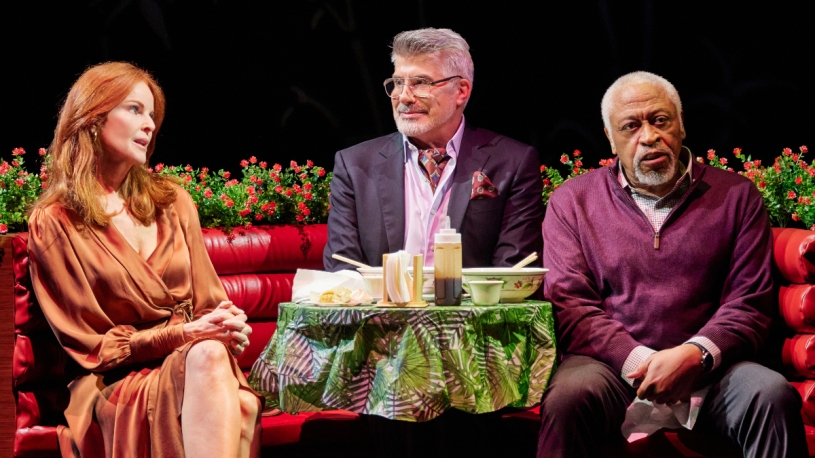Pay the Writer, bestselling novelist Tawni O’Dell’s dramedy that opened Monday at Off Broadway’s Pershing Square Signature Center, seems like the perfect title for a theater piece opening in the midst of a strike by the Writers Guild of America. And the title is lifted from a message scrawled into the front of a book for a film producer by an acclaimed novelist, one who makes a brief foray in Hollywood for which he’s not at all suited.
O’Dell, who’s dabbled in screenwriting to adapt her Oprah-blessed novel Back Roads, seems similarly at sea in telling a story within the framework of a two-hour stage play. She takes what at first seems like a familiar literary premise — the somewhat bumpy relationship of a successful author and his literary agent — but injects it with backstories that are well outside the comfort zone of her personal history. Perhaps that is why they feel so inauthentic.
The author, Cyrus Holt (Ron Canada), is a towering figure of Black literature widely taught in schools, a Vietnam veteran, and a philandering narcissist now on his fourth (much younger) wife as he battles a terminal cancer diagnosis. The agent (Mad Men alum Bryan Batt), meanwhile, is a walking caricature of a gay Boomer from some old TV show: dapperly dressed (including the pocket square), apparently celibate and dispensing witty quips with the swishy ease of a flower girl tossing petals down the wedding aisle.
But aside from one dust-up where Cyrus spouts off a homophobic slur that is quickly smoothed over, there’s no real tension between them — which means that big plot reveal about the subject of Cyrus’s final book isn’t all that interesting. (And doesn’t seem all that likely, given what we learn about poor Bruston Fischer’s work-obsessed life.) Indeed, O’Dell pads her narrative with scenes and entire characters that serve no real purpose beyond amplifying points she’s already established: a French translator (Steven Hauck, with a bad accent) jealous of Bruston’s claim on Cyrus’s attention and a homeless Vietnam vet (Stephen Payne) who appears late in the show apparently to underscore Cyrus’s long-established impact as a writer of note.
The more interesting ideas here are rooted in Cyrus’s all-too-brief encounters with his now-grown children (Miles G. Jackson and Danielle J. Summons), whose upbringing he largely ignored to devote his energies to his work. Each has charted a different path to understanding this fatherly inattention, and you yearn to know more about their lives — and that of their mother, who subsumed her own nascent performing career to support Cyrus and then felt blindsided by the dissolution of their marriage. Marcia Cross (Desperate Housewives) looks fabulous in the role, but her character is laden with more exposition than plausibility.
Of course, these are familiar ideas — the genius who’s difficult to live with is a time-honored trope — but at least they are ideas. “I’ve heard this defense of artists my whole life,” Cyrus says at one point. “How our talent gives us free rein to be complete jerks to the people we love.” It’s too bad that O’Dell does little more than name-check this notion, instead of exploring it.
The tonal shifts in the play can be jarring. Under Karen Carpenter’s uneven direction, the cast veers from sitcom lurches for the punchline to feints at naturalism — and the physical production is similarly scattered, from Christopher Akerlund’s skimpy lighting to David Gallo’s set design that randomly jumps from simplistic scrims to elaborate set-pieces (for Cyrus’s book-filled Village writing studio).

